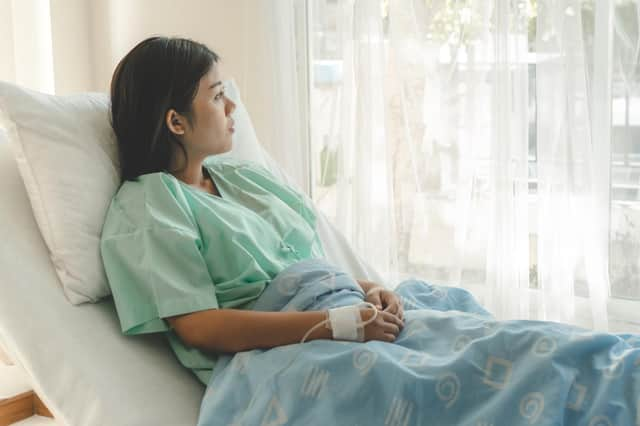Cervical cancer: Women who have received human papillomavirus HPV vaccine have not developed cervical cancer, Scotland study shows


An immunisation programme has stopped women who have received the vaccine from developing cervical cancer, research has shown.
A Public Health Scotland (PHS) study has found not a single young woman who has received the human papillomavirus (HPV) vaccine has gone on to be diagnosed with cervical cancer.
Advertisement
Hide AdAdvertisement
Hide AdHPV is commonly spread through sexual contact and is responsible for almost all cases of cervical cancer – the fourth most common cause of cancer in women worldwide. The vaccination programme started in 2008 and sees boys and girls offered the vaccine in their first year at secondary school.
It also helps to protect both sexes from other HPV-related cancers later in life, such as head, neck and anogenital cancers, as well as genital warts.
The PHS study, which was carried out in collaboration with the universities of Strathclyde and Edinburgh, has concluded the programme is “highly effective” in preventing cervical cancer.
Consent forms for this year’s HPV immunisation programme have already been sent out to parents and carers from schools across most of Scotland.
Young people are being encouraged to talk to adults about the vaccine and return the signed consent forms in time to meet deadlines.
Dr Kirsty Roy, consultant in health protection at PHS and co-author of the study, said: “This study involves every woman in Scotland who is eligible for the cervical cancer screening programme and demonstrates the impact of the HPV vaccine in preventing cervical cancer.
“It shows how effective the HPV vaccine is as there have been no cervical cancer cases to date in fully vaccinated women who were given their first dose at age 12-13 years.
“Vaccination against HPV is shown to be effective in preventing cervical cancer, and along with regular screening for early detection and treatment, it is possible to make cervical cancer a rare disease.”
Advertisement
Hide AdAdvertisement
Hide AdDr Claire Cameron, a fellow consultant in health protection at PHS, said: “By continuing to vaccinate against HPV-related cancers, and encouraging uptake of screening, we hope to see them eliminated in the future.
“I would encourage all S1 pupils in Scotland to take up the offer of the free HPV vaccine in the coming months to protect themselves against future risks.
“PHS is working closely with Scottish Government and local health boards to ensure the continued uptake of the key cervical cancer prevention measures – the HPV vaccine and routine screening.”
Dr Tasmin Sommerfield, clinical adviser for screening at National Screening Oversight (NSO), said: “While the HPV vaccine protects against a lot of the different types of HPV virus that cause cancer, it can’t protect against them all and it’s still important that you go for regular cervical screening.
“Screening can find changes in the cells in your cervix even if you feel healthy and have no symptoms. If these are found at an early stage, they are much easier to treat.
“Cervical screening is the best way of finding out if you are at risk of cervical cancer and I would urge everyone to take up their offer of an appointment.”
Smear tests do not diagnose cancer, but can reveal whether someone is at higher risk of developing it.
This is usually by detecting high-risk HPV, which is recognised as the most common cause of cervical cancer. However, it’s important to note HPV is extremely common, many strains are not linked with cancer, and the body often clears the virus itself with no problems.
Advertisement
Hide AdAdvertisement
Hide AdIf high-risk HPV is detected, samples will then be checked for cell changes, and the results will determine whether someone is then referred for more thorough investigations, treatment, monitoring more closely, or simply invited back for their next routine screening in another three or five years.
Scotland’s minister for public health Jenni Minto said: “We welcome the findings of this report, which shows there have been no cases of cervical cancer detected to date in fully vaccinated women who were given their first dose at aged 12 and 13 years old.
“The HPV vaccine programme is having a huge impact on preventing these cancers for those who have been vaccinated.
“Vaccination and screening remain the most effective ways of preventing and detecting cervical cancer and I would encourage those eligible to come forward to have the vaccine or attend screening appointments.”
Bridget Little, head of support services at Jo’s Cervical Cancer Trust, said: “Cervical screening detects high-risk HPV and is the best way to find out who is at higher risk of developing cervical cell changes or cancer. However, like all screening tests, HPV primary screening isn’t always accurate. There is a small chance your result could be wrong.
“If you have symptoms, you should always discuss these with your GP as soon as possible – don’t wait until your next cervical screening appointment.”
Consultant gynaecologist Dr Jo Bailey says: “The cervical screening programme is very good and has saved many lives, but it is not perfect. Even if you have had a normal smear and have bleeding after sex, pain during sex, or a discharge that smells, you should see your doctor for further investigation.
"For the majority of women, there will be a cause that is not cancer, but it is always worth getting it checked.”
Advertisement
Hide AdAdvertisement
Hide AdDr Bailey also emphasises the importance of seeing your GP for any new, ongoing or worsening symptoms.
“There are a number of conditions that can cause these symptoms," she said. “In the majority of women, there will be a simple cause that is not related to cancer, which can be easily treated. However, in a small number of women there may be something more serious causing the symptoms and this should be investigated.”
Comments
Want to join the conversation? Please or to comment on this article.